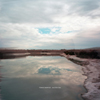
Image by Yöshi Sodeöka
If ever there was a time to marry electronic music’s palette with pop songwriting arrangements, it’s now. Whether it’s rock bands working overtime to update their conventional setups with samplers, synthesizers, and drum machines, or pop vocalists and rappers seeking out club-friendly beats to perform over, many musicians with big aspirations are keenly aware of electronic music’s relevance to contemporary audiences. That knowledge, however, has rarely translated into genuinely exciting, well-produced music. Listeners would have better luck checking out artists like Tomas Barfod, a Danish producer and drummer with a considerable history working in band settings and with electronics, often simultaneously. His recently released second album, Salton Sea, succeeds where many have failed by offering an engaging slate of songs rendered with a seamless mixture of techno’s electronic pulse and organic instrumentation.
Barfod has been developing his sonic craft for more than a decade now, first as one half of dance-pop duo Filur with his countryman Kasper Bjørke and a few years later as the resident beatkeeper and producer for the disco punk trio WhoMadeWho. What comes through on Salton Sea, though, is a production prowess that allowed him to make whole his collaborators’ ideas and sounds. The album finds Barfod working with three vocalists (including Jeppe Kjellberg of WhoMadeWho) and includes writing credits for six artists (including each of the vocalists, Bjørke, and Tomas Høffding, also of WhoMadeWho). Yet its eleven tracks sit together naturally, bearing a unified vision even when the mood or instrumentation changes. Some of this is owed to Barfod’s shift towards more traditional song structures than the noodling experiments featured on his first solo LP, Seriøs, released as Tomboy in 2007.
While many dance-music artists struggle to assiduously adapt the verse-chorus-bridge structure, Barfod’s familiarity with the form allows him to excel, whether on bubbling pop tunes or the instrumentals that stitch the album together. The latter are full-fledged songs themselves rather than interludes, often evolving the melodies and accoutrements orbiting their central motifs. The album kicks off with the propulsive “D.S.O.Y.” whose thrumming synth arpeggios are decorated by delicate leads and shoved forth by live drum breaks. A similar but more slowburning approach gives “Ecstesizing” a more reflective tone, one capitalized upon by the Jeppe Kjellberg-voiced “Don’t Understand” that follows. Barfod captures a disparate rush of sounds on “Baxter St.,” melding what sound like field recordings with tangled strings of melodies and an insistent bass throb. And when he closes the album with “Python”‘s gruff, Italo chug, one hopes it’s just the bridge to the next pop island instead of the end of the line.
As excellent as the instrumentals are, it’s the vocal-led tunes that make Salton Sea unforgettable. Kjellberg sings of the voluntary mental harm we inflict upon ourselves by dredging up the past on “Broken Glass,” his voice detuned to delirious effect. “Till We Die” manages to feel fragile and assertive at once, balancing Nina Kinert’s sweet pleas for love with mallet melodies and a none-too-gentle bass line. Sung by Lydia Ainsworth, “Nighthawke” could be a Fever Ray song discarded for not being freaky enough, her vocals hovering above a commanding synth line that seems to pinwheel ever upwards. But the indisputable highlight is “November Skies,” a tune that encapsulates the best parts of Salton Sea. Kinert’s honeyed voice is a perfect match for the glittering sounds around her, riding a gigantic bass line like a child on their father’s shoulders.
Just as it takes a certain kind of finesse to land an airliner without disturbing the passengers, Salton Sea delights in demonstrating Barfod’s ability to balance dance music’s forceful rhythms with soft, innately human elements. This musical equilibrium heightens the pleasure of his already catchy songwriting and lends the album a versatility such that it can be enjoyed on car speakers as much as through headphones, on quiet nights in or during more festive occasions. As such, Salton Sea is likely to drum up as many admirers outside the dance-music world as in it, a feat which puts its creator in rare company. That Barfod is capable of doing so without putting himself front and center is nothing short of incredible: this is truly an album that wins people over with the strength of its tunes rather than the magnetism of a central figure.

















Nina Kinert’s songs are the best on the album. The chorus on Till We Die sounds like Hindi songs. Do you know if her albums are any good?